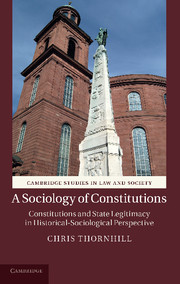 A Sociology of Constitutions
A Sociology of Constitutions Published online by Cambridge University Press: 07 September 2011
Why a sociology of constitutions?
During the emergence of sociology as an academic discipline the questions about the origins, status and functions of constitutions were widely posed. Indeed, for both thematic and methodological reasons, the analysis of constitutions was a central aspect of early sociology. Sociology developed, however ambiguously, as a critical intellectual response to the theories and achievements of the Enlightenment in the eighteenth century, the political dimension of which was centrally focused on the theory and practice of constitutional rule. In its very origins, in fact, sociology might be seen as a counter-movement to the political ideals of the Enlightenment, which rejected the (alleged) normative deductivism of Enlightenment theorists. In this respect, in particular, early sociology was deeply concerned with theories of political legitimacy in the Enlightenment, and it translated the revolutionary analysis of legitimacy in the Enlightenment, focused on the normative claim that singular rights and rationally generalized principles of legal validity were the constitutional basis for legitimate statehood, into an account of legitimacy which observed political orders as obtaining legitimacy through internalistically complex, historically contingent and multi-levelled processes of legal formation and societal motivation and cohesion. This is not to suggest that there existed a strict and unbridgeable dichotomy between the Enlightenment, construed as a body of normative philosophy, and proto-sociological inquiry, defined as a body of descriptive interpretation. Clearly, some theories commonly associated with the Enlightenment pursued an evolutionary line of social reconstruction, and they rejected the idea that political legitimacy could be produced by singular acts of theoretical intelligence.
To save this book to your Kindle, first ensure [email protected] is added to your Approved Personal Document E-mail List under your Personal Document Settings on the Manage Your Content and Devices page of your Amazon account. Then enter the ‘name’ part of your Kindle email address below. Find out more about saving to your Kindle.
Note you can select to save to either the @free.kindle.com or @kindle.com variations. ‘@free.kindle.com’ emails are free but can only be saved to your device when it is connected to wi-fi. ‘@kindle.com’ emails can be delivered even when you are not connected to wi-fi, but note that service fees apply.
Find out more about the Kindle Personal Document Service.
To save content items to your account, please confirm that you agree to abide by our usage policies. If this is the first time you use this feature, you will be asked to authorise Cambridge Core to connect with your account. Find out more about saving content to Dropbox.
To save content items to your account, please confirm that you agree to abide by our usage policies. If this is the first time you use this feature, you will be asked to authorise Cambridge Core to connect with your account. Find out more about saving content to Google Drive.